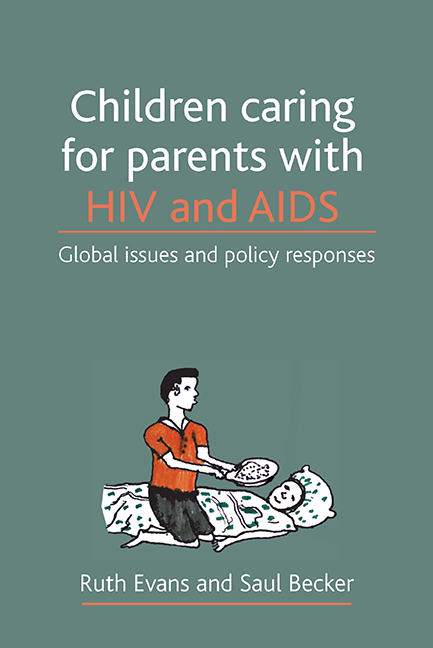Book contents
- Frontmatter
- Dedication
- Contents
- List of tables, figures and boxes
- Preface
- one Children’s and young people’s caring responsibilities within the family
- two HIV and the family
- three Reflexivity, methodology and ethics: the research process
- four Living with HIV and the effects on family life: parents’ narratives
- five Children’s and young people’s care work in households affected by HIV and AIDS
- six Resilience and impacts of care work for individual young people and their families
- seven Resilience and impacts of young people’s care work within the school and wider community
- eight The role of formal safety nets in building children’s and families’ resilience
- nine Global and local processes influencing young people’s caring roles in families affected by HIV and AIDS
- ten Responding to the support needs of children and young people caring for parents with HIV
- Bibliography
- Index
eight - The role of formal safety nets in building children’s and families’ resilience
Published online by Cambridge University Press: 21 January 2022
- Frontmatter
- Dedication
- Contents
- List of tables, figures and boxes
- Preface
- one Children’s and young people’s caring responsibilities within the family
- two HIV and the family
- three Reflexivity, methodology and ethics: the research process
- four Living with HIV and the effects on family life: parents’ narratives
- five Children’s and young people’s care work in households affected by HIV and AIDS
- six Resilience and impacts of care work for individual young people and their families
- seven Resilience and impacts of young people’s care work within the school and wider community
- eight The role of formal safety nets in building children’s and families’ resilience
- nine Global and local processes influencing young people’s caring roles in families affected by HIV and AIDS
- ten Responding to the support needs of children and young people caring for parents with HIV
- Bibliography
- Index
Summary
This chapter focuses on the role of formal safety nets and external support from non-governmental community- and faith-based organisations and governmental/statutory providers in building the resilience of families affected by HIV/AIDS within the context of the North and South. In the previous chapters, we suggested that informal safety nets and supportive relationships within the family, neighbourhood, school and wider community play a crucial role in building children's and families’ resilience and mitigating the negative impacts of young caregiving and HIV/AIDS on households. In severely affected communities in the South, however, these informal safety nets are being overstretched, and the capacity of families and communities to continue to support households affected by HIV/AIDS is being seriously diminished. Governmental/statutory services and civil society organisations can thus help to reduce families’ vulnerability, providing much-needed material and emotional resources and support for children and families affected by HIV/AIDS. In this chapter, we examine the different services and support that children and parents/relatives with HIV accessed in Tanzania and the UK. By drawing on service providers’ and families’ experiences, the chapter identifies practices and approaches that aim to build on children's and families’ strengths, enhance resilience and promote protective factors within different domains, including the community, school, family and for individual children.
Services and support for families affected by HIV/AIDS
The ten non-governmental voluntary and community sector organisations (NGOs) involved in the study in the UK provided a range of services for children and families affected by HIV/AIDS, including: practical support for parents, peer support for parents, leisure and social activities for young people in similar situations, family support, emotional support for children and parents, practical support for young people, and HIV awareness-raising activities (see examples in Table 8.1).
In Tanzania, the seven NGOs involved in the study provided a range of services for families affected by HIV/AIDS, including: home-based care, support groups for people living with HIV, community education and awareness raising, material and emotional support for orphans and vulnerable children, opportunities for the development of young people's life skills, and voluntary testing and counselling facilities. Examples of the support offered are listed in Table 8.2.
As discussed in Chapter 3, the families interviewed for this study were recruited through local non-governmental voluntary and community sector organisations who were in contact with the family.
- Type
- Chapter
- Information
- Children Caring for Parents with HIV and AIDSGlobal Issues and Policy Responses, pp. 201 - 226Publisher: Bristol University PressPrint publication year: 2009



